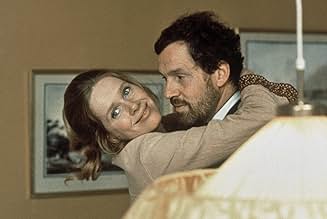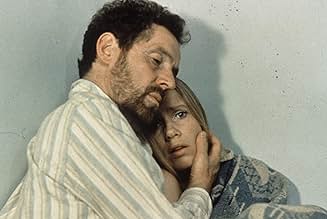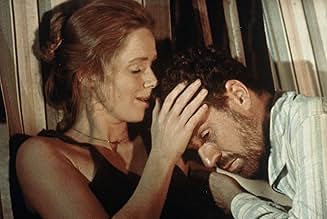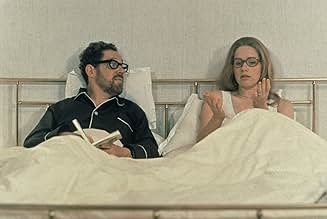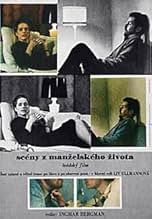Scènes de la vie conjugale
Titre original : Scener ur ett äktenskap
NOTE IMDb
8,5/10
17 k
MA NOTE
Ajouter une intrigue dans votre langueTen years within the marriage of Marianne and Johan.Ten years within the marriage of Marianne and Johan.Ten years within the marriage of Marianne and Johan.
- Récompenses
- 3 victoires au total
Parcourir les épisodes
Histoire
Le saviez-vous
- AnecdotesAccording to an interview with Ingmar Bergman, after the TV mini-series was broadcast in Sweden, the divorce rate in Sweden increased substantially and the number of married couples who seek marriage counseling also doubled.
- Crédits fousThe end credits aren't shown on-screen but read by director and writer Ingmar Bergman, while "a beautiful picture of Fårö" is shown (different for each episode). Bergman himself is not credited at all.
- Versions alternativesBergman prepared a four-hour version of "Scenes from a Marriage," hoping it would be shown as a two-part film. It never appeared in the US, although the original six-hour mini-series was shown on PBS after the 168 minute cut had played theatrically.
- ConnexionsEdited into Scènes de la vie conjugale (1974)
- Bandes originalesConcerto for violin, strings & continuo in B flat major, Op. 10, No. 1
(uncredited)
Written by Tomaso Albinoni
A short extract is played during the very beginning and end of each episode (it's not featured in the theatrical version)
Commentaire à la une
Scenes from a Marriage (the TV version, even as the theatrical cut is still very good and worth the time if the only copy available) is an intimate, naturalistic portrait of a couple, who at first are seemingly happy, then aren't, then try and find out where they go wrong. It's involving drama at its nexus, and for those who love the theater it's an absolute must see (aside from the theme, no music, all talk). Johan and Marianne are two of Bergman's most interesting, true characters (among his countless others) that he's ever presented, and like many other film artists, you can tell he's lived through at least some if not most of the emotions and trials these characters have been through.
Along with several supporting characters, two of the more notable ones played by Bibi Andersson and Malmjso are a perfect contrast in the first episode of the series. The conflicts that are established throughout the series never pay-off in a mis-fire. Craft-wise there is almost no style except for the minimal lighting by the great Sven Nykvist. And the dialog that goes on between the two leads goes from amusing to tragic, from romantic to bleak, and with all the emotions that I (as one who's never been married) can only guess can be as so. Bergman's script would be just that, a poignant, very profound lot of bits between two people more or less on paper, if not for Liv Ullmann and Erland Josephson. They turn on the emotions intuitively, like they've been these people somewhere else at some other time. Or rather, the husband and wife don't have very complicated jobs or economic situation, but the problems lie on the emotional plane, and the intellect they try to put to it. Johan loves another woman, how does that affect Marianne? Marianne asks for a divorce, how does that affect Johan? What will they do to cope? These are questions Bergman poses for his actors, among plenty of others, and they pull off the emotional cues off of each other like the most wonderful theatrical pros.
It's hard to find anything wrong with their acting, cause they don't over-do it (unless you're not into Marianne's changes in feeling in some scenes, which could be understandable), and the bottom line is that despite it being in Europe thirty years ago, it's highly possible these people could be in your house, or in your neighbor's house. Ullmann's Marianne is the 180 of her character from Persona, who could only let out emotions once or twice, mostly as an observer. Josephson's Johan is complex behind is usually sarcastic and simple demeanor- what drives him to do what he does in episode three, or in four? What will the conclusion lead to? Bergman creates a drama that is never boring, never diluted, and asks us to search for ideas about love and relationships we sometimes try and push away. It's a superb, concise treatise about the nature of falling in and out of love, how to differentiate what love is, and essentially what a marriage is. I can't wait to see the sequel, Saraband, which is Bergman's (definite) last film.
Along with several supporting characters, two of the more notable ones played by Bibi Andersson and Malmjso are a perfect contrast in the first episode of the series. The conflicts that are established throughout the series never pay-off in a mis-fire. Craft-wise there is almost no style except for the minimal lighting by the great Sven Nykvist. And the dialog that goes on between the two leads goes from amusing to tragic, from romantic to bleak, and with all the emotions that I (as one who's never been married) can only guess can be as so. Bergman's script would be just that, a poignant, very profound lot of bits between two people more or less on paper, if not for Liv Ullmann and Erland Josephson. They turn on the emotions intuitively, like they've been these people somewhere else at some other time. Or rather, the husband and wife don't have very complicated jobs or economic situation, but the problems lie on the emotional plane, and the intellect they try to put to it. Johan loves another woman, how does that affect Marianne? Marianne asks for a divorce, how does that affect Johan? What will they do to cope? These are questions Bergman poses for his actors, among plenty of others, and they pull off the emotional cues off of each other like the most wonderful theatrical pros.
It's hard to find anything wrong with their acting, cause they don't over-do it (unless you're not into Marianne's changes in feeling in some scenes, which could be understandable), and the bottom line is that despite it being in Europe thirty years ago, it's highly possible these people could be in your house, or in your neighbor's house. Ullmann's Marianne is the 180 of her character from Persona, who could only let out emotions once or twice, mostly as an observer. Josephson's Johan is complex behind is usually sarcastic and simple demeanor- what drives him to do what he does in episode three, or in four? What will the conclusion lead to? Bergman creates a drama that is never boring, never diluted, and asks us to search for ideas about love and relationships we sometimes try and push away. It's a superb, concise treatise about the nature of falling in and out of love, how to differentiate what love is, and essentially what a marriage is. I can't wait to see the sequel, Saraband, which is Bergman's (definite) last film.
- Quinoa1984
- 15 oct. 2004
- Permalien
Meilleurs choix
Connectez-vous pour évaluer et suivre la liste de favoris afin de recevoir des recommandations personnalisées
- How many seasons does Scenes from a Marriage have?Alimenté par Alexa
Détails
- Durée4 heures 43 minutes
- Mixage
- Rapport de forme
- 4:3
Contribuer à cette page
Suggérer une modification ou ajouter du contenu manquant

Lacune principale
By what name was Scènes de la vie conjugale (1973) officially released in India in English?
Répondre
